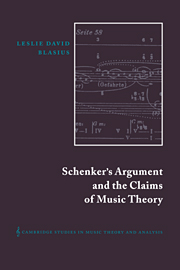III - The objective synthesis
Published online by Cambridge University Press: 28 October 2009
Summary
THE COORDINATION OF DISCOURSES
We now have two readings of Schenker, each of which addresses a strategy for appropriating and then subsuming the authority of the new musical sciences of the later nineteenth century – a strategy involving the seeming reversal of discursive modes substituting, on the one hand, a descriptive and analytic psychology of music for the experiments and hypotheses of the psychoacoustician and, on the other, an explanatory and constructivist history of music for the historiography of the musicologist. The natural progression of our argument is obvious: while each of these readings may in turn be less than satisfying as an explication of why Schenker makes such strong claims in his later analysis and of how he satisfies these claims, we would assert that such an explication is within reach through a combination of these two readings.
But we let ourselves off of the hook too easily. Neither reading seems adequately to engage the question of definite purpose and intention. In other words, neither reading tells us why Schenker has done what we think he has done. We cannot bolster each of these readings individually in this regard: each argument must stand as it is. Thus, in examining the reconciliation of Schenker's two strategies, we need to search for a broader epistemology, one which itself can explicate his intention and purpose.
To this end, we would first conceive of these readings a bit differently. We would hope to prove that Schenker's mature analysis is truly a complex argument. Each of our readings describes a trajectory through Schenker's work, from Harmony and Ornamentation to this complex argument, to Free Composition.
- Type
- Chapter
- Information
- Schenker's Argument and the Claims of Music Theory , pp. 86 - 135Publisher: Cambridge University PressPrint publication year: 1996



